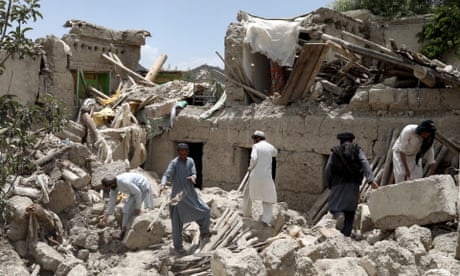Shadi Khan Saif
The country has been out of the spotlight since US forces left but environmental disasters and the threat of another food crisis should be front-page news
The main attention Afghanistan gets these days is when big international aid agencies put together posters of hungry women and children for donations, or when a calamity like the June 2022 earthquake hits.
But as you are reading these lines, many towns and villages in the war-ravaged country remain submerged by flash floods triggered weeks ago by a relentless spate of untimely rains and melting glaciers, claiming lives and destroying livelihoods of marginalised communities already surviving on small amounts of foreign aid.
It’s currently peak summer harvest season when farmers gather fruits and collect staples for the approaching winter. But it snowed briefly in the central highlands after long and crippling dry spells, when farmers were desperately longing for the usual spring season rains.
Then came violent hail storms destroying orchards and eventually rain that ruined the wheat crops. None of these events are anywhere near normal in terms of the climate of this landlocked country of nearly 40 million people.
The glaciers in the Himalayas are melting at an unmatched pace, bringing the deadly floods from the mountains of the northern provinces all the way down to the plains in the south. These fast-depleting glaciers are the lifeline of Afghans who rely heavily on the natural streams and rivers. Despite this, there has been no development work on water preservation, storage and distribution over the past couple of decades on a national level. The underground levels are dropping at an alarming rate as it is the only way for locals to look for water.
Prior to the latest downpours, the drought was so severe and the heatwave so intense it led to multiple occurrences of forest fire in the country’s east and south. This was a grim tragedy. Locals in the fire-affected Khost and Nuristan provinces had to rely on youth from the local communities to put out the fires by carrying buckets of water and sand with their bare hands, day and night.
The climate crisis is so real in the country that it will likely trigger another food crisis in the months to follow. All this at a time when the delivery of aid is hampered and overshadowed by the Russian invasion of Ukraine, leading to supply chain disorders, inflation and donor fatigue.
Before Afghanistan plunged into the current crisis, the country was promised some funding from the Green Climate Fund, but with the fall of Kabul to the Taliban it seems the world has simply abandoned the country, turning a blind eye to the escalating disasters.
Amid all this, Afghanistan’s neighbours have manipulated the situation to their advantage with dodgy deals with the Taliban that would give them access to the country’s rich natural resources at throwaway prices, propping up a funding stream for the defecto regime.

The quest for coal even prompted Pakistani authorities to make non-stop border-crossing arrangements during the day and night – a privilege that was not even offered during the peak of the war when thousands of war-weary Afghans were fleeing the country in all directions.
The search for Afghanistan’s untapped mineral wealth even attracted Australia’s richest man, Andrew Forrest, to the country just weeks before the Taliban takeover.
Reporting on environmental disasters in Afghanistan is important, as it would serve as a catalyst for the entire green movement around the world to hold deniers and polluters to account.
The local media – the few surviving outlets post the Taliban takeover – is unable or unwilling to critically report on all of this because of obvious fears of retaliation. And for the international media, the Afghanistan story seems to have hit a dead-end of sadness, with nothing new or “exciting’ for the international media or its consumers.
One can dispute matters of politics in the country, but the climate calamity Afghanistan is facing is imposed from outside. It’s time the world, and neighbouring and regional polluters, take responsibility.
- Shadi Khan Saif is an Afghan journalist based in Melbourne
 Afghanistan Peace Campaign
Afghanistan Peace Campaign